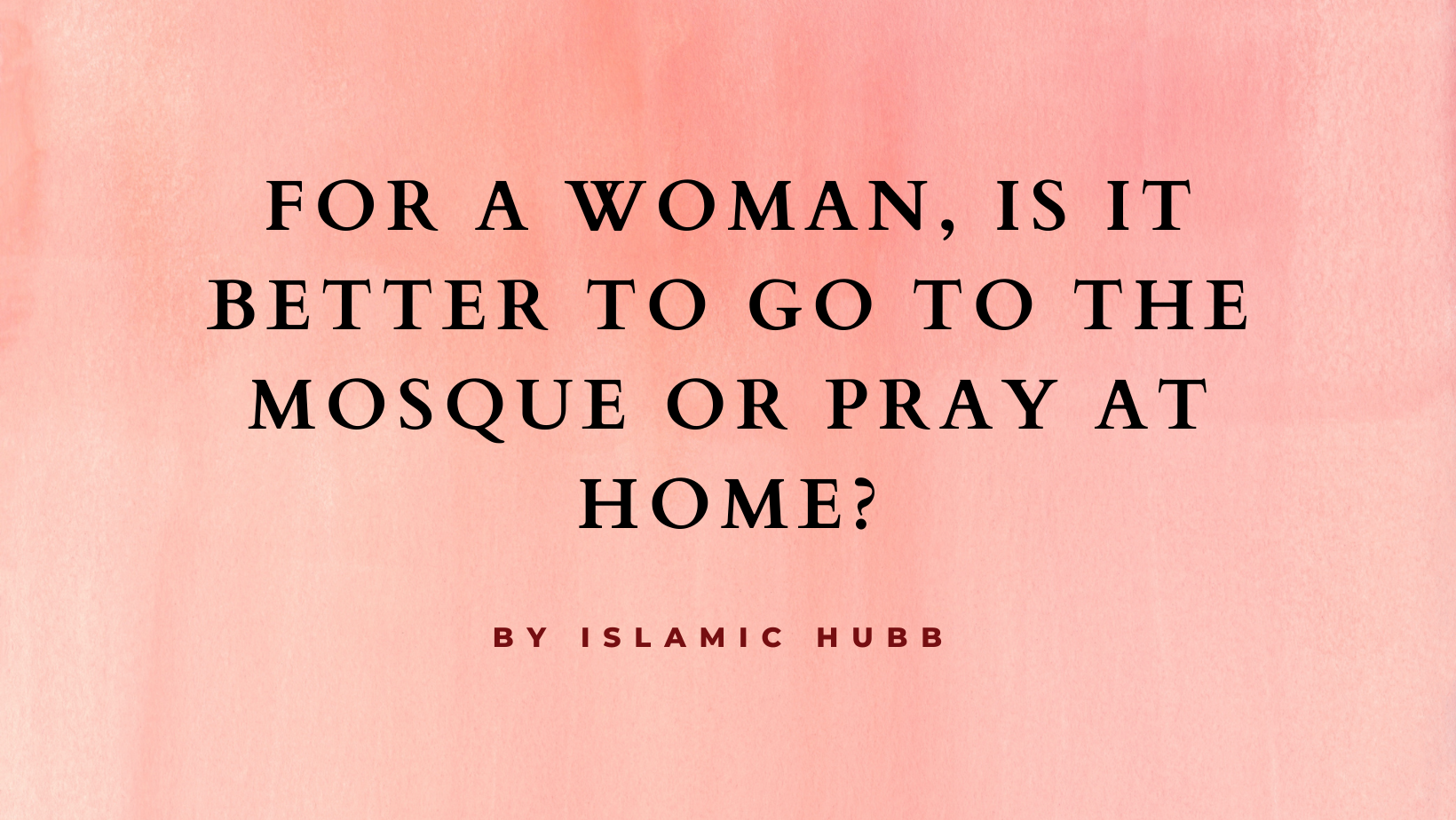For a woman, is it better to go to the mosque or pray at home?
Written by: Mufti Mohammed Kafeel Ahmed Director, ISLAMIC HUBB
Islam is a global, peace-loving religion that grants complete rights to every being in the universe. If there has been any deviation from the truth, history bears witness that it was not due to the weakness of Islamic teachings but rather the shortcomings of Muslims in practicing them. The depth and moderation of Islam stem from the fact that Allah has sent down a perfect law, considering the human nature, which the Messenger of Allah (ﷺ) conveyed without any deficiency. Allah has commanded: “Whatever the Messenger ﷺ has given you, take it, and whatever he has forbidden you, refrain from it” (Surah Al-Hashr 59:7). The Prophet (ﷺ) taught his companions the teachings of the Shari’ah with its outward and inward aspects, actions, and purposes.The companions, with their knowledge, actions, temperament, and taste, embraced Islam in every aspect, to the extent that Allah himself mentioned in Qu’ran about the companions and their followers’ integrity and Allah’s love for them. “And the first forerunners [in the faith] among the Muhajireen and the Ansar and those who followed them with good conduct – Allah is pleased with them and they are pleased with Him, and He has prepared for them gardens beneath which rivers flow, wherein they will abide forever. That is the great attainment” (Surah At-Tawbah 9:100). Allah has also commanded the entire Ummah to follow the path of the companions: “And whoever opposes the Messenger ﷺ after guidance has become clear to him and follows other than the way of the believers – We will give him what he has taken and drive him into Hell, and evil it is as a destination” (Surah An-Nisa 4:115). Hence, it is incumbent upon us to understand that the acceptance of the Qur’an and Hadith without following the ways of the companions is not permissible. Otherwise, it will lead us astray from the path of the believers.
The purpose of writing such a comprehensive introduction is to convey that Islam does not accept the practice of the Qur’an and Hadith without adhering to the ways of the companions and their followers. Once this understanding is achieved, we present our second case. During the time of the Messenger of Allah (ﷺ), which is considered the best era, women were allowed to go to the mosque for the obligatory prayers in nights with the permission of their husband and without adorning themselves and in a modest state. This permission was granted to obtain the blessing of following the Prophet’s example. The Prophet ﷺ himself did not prefer women coming to the mosque for prayers. He ﷺ said, “The prayer of a woman in her house is better than her prayer in her courtyard, and her prayer in her private room is better than her prayer in her house” (Sunan Abi Dawood 570). When Umm Humayd Sa’di expressed her desire to pray in the mosque, the Prophet ﷺ said, “I know that you love to pray with me, but your prayer in your house is better for you than your prayer in your courtyard, your prayer in your courtyard is better for you than your prayer in your house, your prayer in your house is better for you than your prayer in your neighborhood mosque, and your prayer in your neighborhood mosque is better for you than your prayer in my mosque” (Musnad Ahmad 27090). In completion of this command, Umm Humaid Sa’di built a dark room in her house and continued offering prayers in it until her death. Therefore, it can be estimated that the Prophet ﷺ did not prefer women coming to the mosque. The temperament of the Shari’ah also demands that women stay at home and perform their worship and prayers at home: “And abide in your houses and do not display yourselves as [was] the display of the former times of ignorance. And establish prayer and give zakah and obey Allah and His Messenger ﷺ. Allah intends only to remove from you the impurity, O people of the [Prophet’s] household, and to purify you with [extensive] purification” (Surah Al-Ahzab 33:33).
Therefore, in accordance with the nature of the Shariah, Hazrat Umar Radhiallahu anhu (whose views were supported by Allah in The Quran through several revelations and he was in the company of the Prophet ﷺ for a long period ) prohibited women from going to the mosque. When women complained to Hazrat Aisha about this, she also affirmed Hazrat Umar’s decision (Bukhari 869). It is necessary for the entire Ummah to consider this consensus of the companions as a source of guidance, for they understood the Quran, Hadith, and the methodology of the Prophet (ﷺ) better than anyone else. That’s why Allah gave them the assurance of his approval. Deviating from their methodology leads not only to misguidance but also to disbelief. Thus, the temperament of the Shari’ah demands that women stay at home and perform their worship and prayers at home. As far as women’s Religious education is concerned, it was not conducted in the mosque during the time of the Messenger of Allah ﷺ; rather, he fixed a specific day for gathering at a house, and women used to acquire religious knowledge through the wives of the Prophet ﷺ.
Therefore, we should establish a permanent system for women’s religious education. Not establishing a system is our mistake, as it may lead us to the extent that we bring changes to the Quran instead of changing ourselves.
Some individuals, keeping the apparent meaning of the Hadith in mind, ask that if it is allowed, so why is it being restricted? It should be understood that some things are permissible but disliked, just as divorce is permissible but disliked. When harm is being caused by something permissible, it is also prohibited, as in the case of walking, which is a permissible act, but when it is done with the intention of theft, it becomes forbidden. Some individuals use women’s movement in the markets as an argument, stating that if they can go to the markets, why can’t they go to the mosque? In reality, it is not established from the Quran, Hadith, or the practice of the companions that women’s movement in the markets is permissible. Abandoning the methodology of the companions and relying solely on the Quran and Hadith without the understanding of the temperament of the Shari’ah leads people not only astray but also to disbelief.
No one should misunderstand this article as forbidding women from entering the mosque. In cases of necessity, they are certainly allowed to enter. However, there should be a special system and places for women in mosque near markets, railway stations, bus stands, etc., so that their prayers are not missed when they are present there.
In conclusion, I request my fellow brothers and sisters in faith to seriously ponder over this issue. If you have any question, please feel free to ask in comments or you can contact us directly.





Ghar me namaz padhna afzal hai
Bilkul
Home is better than mosque
Of course
Masha allah sir ur conclusion is alhamdulila if it can be implemented
Jazakallah khair